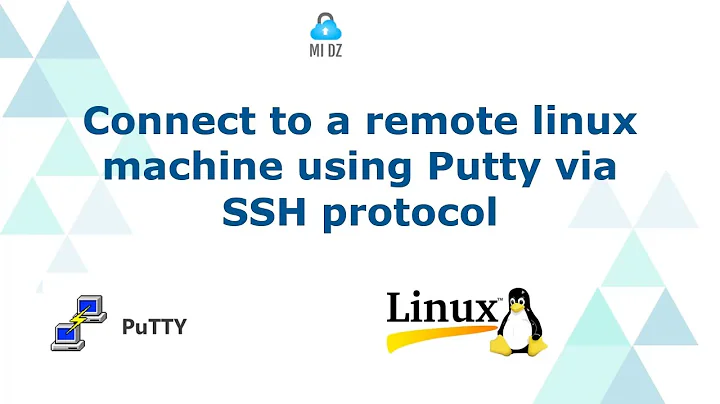How to delete a file on remote machine via SSH by using a shell script?
Solution 1
You can pass the SSH client a command to execute in place of starting a shell by appending it to the SSH command.
ssh [email protected] 'rm /some/where/some_file.war'
You don't have to cd to a location to remove something as long as you specify the full path, so that's another step you can skip.
The next question is authentication. If you just run that, you will get prompted for a password. If you don't want to enter this interactively you should set up public key authentication.
Solution 2
If you wish to delete remote file with the use of sudo, you need to execute something like this:
ssh -tt user@host 'stty raw -echo; sudo rm /path/to/file' < <(cat)
Solution 3
The ssh command has a command parameter (last parameter in the command) that you can use to run remote commands.
Solution 4
Setup passwordless keys then add the command as part of the ssh command. See: http://www.dotkam.com/2009/03/10/run-commands-remotely-via-ssh-with-no-password/
Related videos on Youtube
Comments
-
 mico almost 2 years
mico almost 2 yearsI am writing a shell script where I have to delete a file on a remote machine via a shell script.
Manual workflow:
- Log on to remote machine:
ssh [email protected] - At the remote machine (
domain), type the following commandscd ./some/where rm some_file.war
How should I accomplish that task in a script?
- Log on to remote machine:
-
Scott C Wilson almost 13 yearsI thought -c was cipher_spec - no? I didn't think -c was required for command passing.
-
 mico almost 13 yearsThank you all you guys for quick answers. This answer was the one containing the most of the parts to the solution so @Caleb got the tick this time.
mico almost 13 yearsThank you all you guys for quick answers. This answer was the one containing the most of the parts to the solution so @Caleb got the tick this time. -
Len Smith about 10 yearsShould we add
-ftormexecuting remote call ? -
tcoolspy about 10 years@Fedir NO! The question specifically asks about files not directories and if there are any warnings or errors thrown by
rmthey should certainly be passed on to the caller unless the user knows what to expect and why they are overriding something. Lots of mistakes and frustrating debuging later can be avoided by only using the options you need in a given senario. -
Len Smith about 10 years@Caleb Ok, but if I would like to remove the file without interactive prompt ? "Do You really would like to delete .... ?" (Note : I'm asking not about
-r, but-f) -
tcoolspy about 10 years@Fedir The
-foption tormis short for--forceand has an effect an whether errors are thown for non-existing files or bogus arguments. Usually commands run over non interactive shells default to being less interactive anyway, but it yous is not or you are getting an interactive prompt the thing to do would be to fix the settings directly related to that. If you are scripting this you shouldn't have that issue anyway, and if you are in an interactive shell (where you have the possibility of catastrophic typos) you should use-Ion--interactive=neverto set your desired behavior. -
TheNone about 7 yearswhat about "Host key verification"? @Caleb
-
 SDsolar over 6 yearsTo force it to remove a read-only file your command would be
SDsolar over 6 yearsTo force it to remove a read-only file your command would bessh somesystem 'rm -f somefile'




